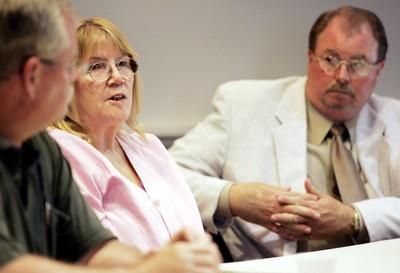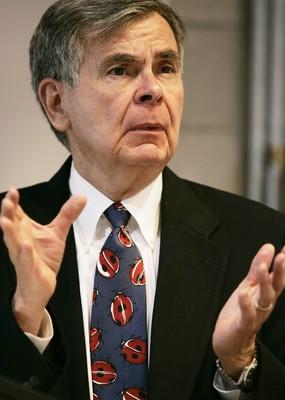Journalists hear criticism of crime reporting
A Henderson boy was one of three high school students killed when their drunken friend crashed the car they were riding in into a wall.
A 19-year-old had been killed execution style in a Las Vegas home along with three other people.
A 16-year-old was shot in the back and killed by a man in the country illegally.
With the families' pain still raw, emotions going from disbelief to shock to anger, the relatives were confronted by television cameras and newspaper reporters. The crimes and personal family tragedies had become news stories.
Three fathers whose children were victims in high-profile Las Vegas Valley crimes talked about the media's treatment of crime victims to a group of practicing and prospective journalists Saturday.
A fourth panelist, Judy Stewart Mauro, had the opposite experience. Her stepson was killed by a drunken driver in February 2006. Three months later, her husband was killed by a drunken driver. The crimes received virtually no coverage.
The seminar, sponsored by the Society of Professional Journalists Las Vegas and University of Nevada, Las Vegas chapters, was called "Victimizing the Victims?" and focused on the media's treatment of families and victims of crimes.
Fred Brown, co-chairman of SPJ's National Ethics Committee and a columnist for the Denver Post, moderated the forum. He read from the Society of Professional Journalists code of ethics: "Ethical journalists treat sources, subjects and colleagues as human beings deserving of respect."
"We don't always do a very good job of that," Brown said.
A printed flyer for the discussion asked the question: "In our coverage of crime, do we sometimes cause further harm and grief for victims and their families?"
The answers to that question, like the families' stories, were not simple.
While the families of these victims of violent crime had some praise for journalists, especially when they showed restraint and compassion, they also had criticisms.
Rick Poff, father of Kyle Poff, remembers television news vans showing up at his house hours after he found out in 2003 that his son was dead. Kyle was one of three Henderson high school students who died after their friend crashed his car while driving 80 mph.
He said he was misquoted by print reporters and that television stations edited his statements and misrepresented what he meant to say.
Television stations played repeatedly video of the boys in body bags being wheeled to the coroner's vehicle.
"There should be more sensitivity and respect," Poff said. Reporters "will keep bugging you. They'll sit there on the phone asking you like a baby asking for a bottle."
But he also said some reporters were compassionate.
"When you talk to victims, remember they're victims," he said. "Put yourself in their shoes. Go easy at first, until their feet are under them."
Matt Mowen was one of four young men bound and killed during a home invasion robbery in 1998. His father, David Mowen, told the audience that when families find out about the violent loss of a loved one, "You're in another world. Everything is cloudy. There's hurt, anger, everything is going on."
He said the media initially reported that the murders occurred during a drug deal that had gone bad. That wasn't the case, though.
"I promise, there's no way any of you out there could step into our shoes," he said. "I don't want you to. What I want is for you to try to be understanding."
Joey Cornell, 16, died from multiple gunshots in 1998.
His father, Ron Cornell, said that television reports kept saying the shooting was the result of an "ongoing family feud."
"There was no family feud," he said.
He eventually became friends with some members of the news media. And when Gonzalo Villalobos fled to El Salvador, Review-Journal articles about the case ginned up national interest, led to an extradition agreement with El Salvador and the shooter being featured on America's Most Wanted. He was eventually captured in New York.
"I learned how to use the media in my favor," Mowen said.
Stewart Mauro said she never wanted to get attention for herself or others, but that people should know the impact of drunken drivers, and how they change lives.
"I wasn't searching for mass sympathy, but (drunken driving) has to stop," she said. "When you're out there, you're covering a story. You're covering a story of real people, with families that grieve."
Her stepson Donn Mauro, 24, had been picking up dinner a block away from his house when he was hit by a drunken driver who had been celebrating his 21st birthday.
Donn Mauro's new wife, Khim Mauro, a native of Burma, could face deportation because the couple had not been married for two years.
Three months after her stepson's death, Stewart Mauro and her husband, Alfonzo Mauro, were celebrating her birthday, when they pulled out of a parking lot and their car was hit by a drunken woman who had her 3-year-old in the car. Alfonzo Mauro died a week later. She spent weeks in the hospital.
All the panelists wanted to see more focus on the lives of the victims of crimes, and less on who the perpetrators were.


















